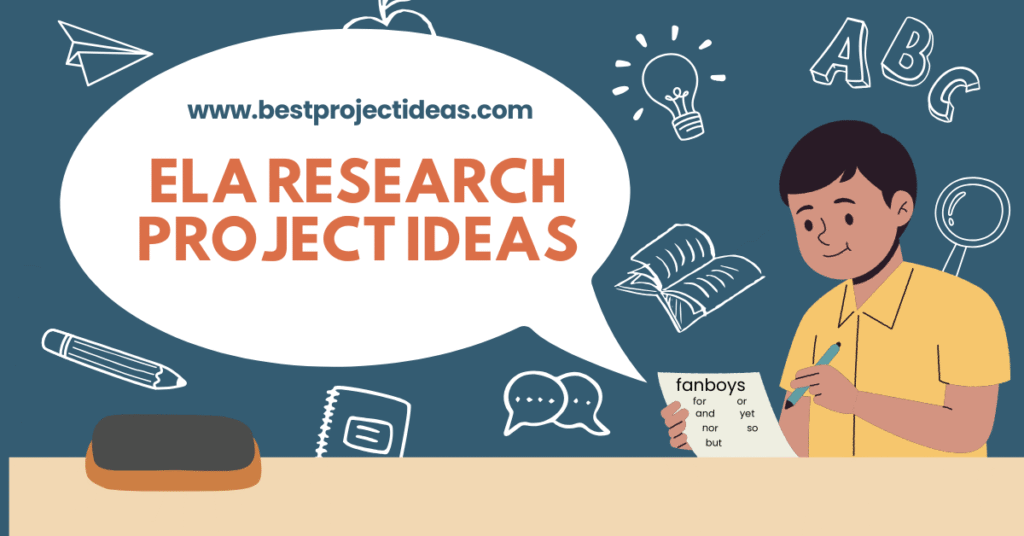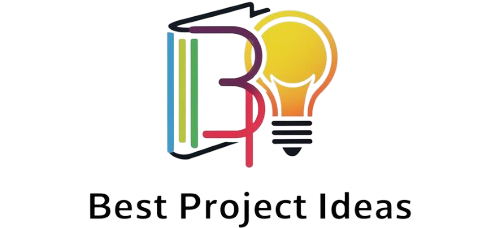
Embarking on an English Language Arts (ELA) research project can be both exciting and challenging. Whether you’re analyzing literature, exploring language patterns, or examining the impact of media on language, a solid foundation and clear plan will set you up for success.
This article will guide you through choosing the perfect topic, understanding why ELA projects matter, showcase popular topics with associated skills, and address trending questions that students ask via AI-powered searches.
Must Read: 79+ Graduation Project Ideas for Architecture: Your Guide to Inspiration, Execution, and Showcase
How Do I Choose a Project Topic in ELA Research?
- Identify Your Interests
- Reflect on the books, authors, films, or linguistic phenomena that captivate you.
- Consider topics that you’d enjoy studying for several weeks.
- Evaluate Resources
- Ensure you have access to primary texts (novels, poems, articles) and secondary sources (critical essays, scholarly articles).
- Check availability in your school library or online databases.
- Align with Learning Goals
- Link your topic to course objectives: literary analysis, language structure, communication skills, or media literacy.
- Discuss your ideas with your teacher to confirm they meet curriculum standards.
- Narrow the Scope
- Avoid topics that are too broad (e.g., “Shakespeare”). Instead, focus on “Gender roles in Shakespeare’s Macbeth.”
- A focused question helps keep research organized and manageable.
- Formulate a Research Question
- Turn your topic into an open-ended question that invites analysis (e.g., “How does symbolism shape the theme of identity in The Great Gatsby?”).
- A clear research question will drive your methodology and structure.
Top 89+ ELA Research Project Ideas 2025-26
Classic Literature Analysis
- Title: Exploring Themes in To Kill a Mockingbird
Objective: Analyze central themes of justice and empathy.
Materials: Copy of To Kill a Mockingbird, theme-tracking graphic organizer, highlighters.
Class: Grade 10 - Title: Character Development in Pride and Prejudice
Objective: Trace Elizabeth Bennet’s growth through key chapters.
Materials: Novel text, character analysis chart, sticky notes.
Class: Grade 11 - Title: Symbolism in The Great Gatsby
Objective: Identify and interpret major symbols (e.g., green light).
Materials: Novel excerpts, symbol mapping worksheet, colored pencils.
Class: Grade 12 - Title: Narrative Voice in Wuthering Heights
Objective: Compare multiple narrators’ reliability.
Materials: Text passages, Venn diagram handout, writing journal.
Class: Grade 11 - Title: Moral Dilemmas in Les Misérables
Objective: Discuss ethical choices of Jean Valjean vs. Javert.
Materials: Adapted novel sections, debate cards, rubric.
Class: Grade 12 - Title: Historical Context of Jane Eyre
Objective: Research Victorian England’s influence on the story.
Materials: Secondary sources, timeline template, internet access.
Class: Grade 10 - Title: Feminist Readings of Madame Bovary
Objective: Examine Emma Bovary’s role in 19th‑century gender norms.
Materials: Novel, scholarly article, annotation tools.
Class: Grade 12 - Title: Irony in The Importance of Being Earnest
Objective: Identify examples of dramatic and situational irony.
Materials: Play script, irony worksheet, highlighters.
Class: Grade 11 - Title: The Hero’s Journey in Beowulf
Objective: Map Beowulf’s journey onto the monomyth structure.
Materials: Epic poem excerpts, hero’s journey chart, markers.
Class: Grade 10 - Title: Gothic Elements in Frankenstein
Objective: Analyze mood and setting that create gothic tone.
Materials: Novel, setting analysis guide, art supplies.
Class: Grade 11
Contemporary Literature Studies
- Title: Identity in The Kite Runner
Objective: Explore themes of guilt and redemption.
Materials: Novel, theme worksheet, index cards.
Class: Grade 12 - Title: Cultural Conflict in Americanah
Objective: Examine immigrant experience and race.
Materials: Novel excerpt, research articles, discussion prompts.
Class: Grade 11 - Title: Coming‑of‑Age in The Perks of Being a Wallflower
Objective: Analyze protagonist’s emotional growth.
Materials: Novel, character journaling pages, pens.
Class: Grade 10 - Title: Dystopian Society in The Handmaid’s Tale
Objective: Investigate government control and resistance.
Materials: Novel, news clippings on current events, debate format.
Class: Grade 12 - Title: Environmental Themes in Flight Behavior
Objective: Study climate change symbolism.
Materials: Novel, scientific articles, poster board.
Class: Grade 11 - Title: Social Media in Little Fires Everywhere
Objective: Discuss how technology affects relationships.
Materials: Novel, social media case studies, chart paper.
Class: Grade 10 - Title: Multicultural Voices in Interpreter of Maladies
Objective: Compare cultural perspectives across stories.
Materials: Short story collection, comparative grid, colored pens.
Class: Grade 11 - Title: Narrative Structure in Gone Girl
Objective: Analyze unreliable narration techniques.
Materials: Novel, timeline worksheet, sticky notes.
Class: Grade 12 - Title: Family Dynamics in Educated
Objective: Examine memoir techniques to portray trauma.
Materials: Memoir text, trauma-informed analysis guide, journal.
Class: Grade 11 - Title: Satire in The Sellout
Objective: Identify satirical elements and social critique.
Materials: Novel, satire chart, discussion prompts.
Class: Grade 12
Poetry Analysis
- Title: Imagery in Robert Frost’s “Stopping by Woods”
Objective: Explore the use of natural imagery and symbolism.
Materials: Poem text, imagery worksheet, colored pencils.
Class: Grade 9 - Title: Free Verse vs. Sonnet Forms
Objective: Compare structure, meter, and rhyme schemes.
Materials: Poem samples, chart paper, meter guide.
Class: Grade 10 - Title: Theme of Loss in Sylvia Plath’s Poetry
Objective: Analyze emotional tone and word choice.
Materials: Collected poems, tone-tracking sheet, highlighters.
Class: Grade 11 - Title: Sound Devices in Edgar Allan Poe’s “The Raven”
Objective: Identify alliteration, assonance, and internal rhyme.
Materials: Poem text, sound device chart, audio recording.
Class: Grade 9 - Title: Modern Slang in Spoken‑Word Poetry
Objective: Study how poets use vernacular for impact.
Materials: Video recordings, transcript, slang glossary.
Class: Grade 11 - Title: Haiku and Cultural Context
Objective: Research traditional Japanese haiku structure.
Materials: Haiku examples, notebook, reference book.
Class: Grade 9 - Title: Political Protest in Langston Hughes’s Poetry
Objective: Examine historical context and poetic devices.
Materials: Poems, history texts, presentation software.
Class: Grade 12 - Title: Ekphrastic Poetry Response
Objective: Write poems inspired by visual art.
Materials: Art images, paper, writing prompts.
Class: Grade 10 - Title: Poetry Translation Challenges
Objective: Translate a short foreign poem and discuss nuances.
Materials: Original poem, bilingual dictionary, notebook.
Class: Grade 12 - Title: Narrative Voice in Epic Poetry
Objective: Compare first‑person vs. third‑person narration.
Materials: Excerpts from epics, voice-analysis chart, pen.
Class: Grade 11
Drama and Play Analysis
- Title: Social Class in A Raisin in the Sun
Objective: Analyze how setting reflects economic status.
Materials: Play script, stage design sketches, rubric.
Class: Grade 11 - Title: Tragic Flaw in Macbeth
Objective: Identify Macbeth’s hamartia and its consequences.
Materials: Script excerpts, tragedy chart, sticky notes.
Class: Grade 10 - Title: Dialogue Techniques in Modern Drama
Objective: Compare realistic vs. stylized dialogue.
Materials: Play excerpts, dialogue worksheet, audio clips.
Class: Grade 12 - Title: Role of the Chorus in Greek Tragedy
Objective: Research and perform a choral ode.
Materials: Translated text, performance space, costumes.
Class: Grade 10 - Title: Stage Directions and Audience Experience
Objective: Map how stage directions guide viewer perception.
Materials: Full script, stage diagram, colored markers.
Class: Grade 11 - Title: Gender Roles in Shakespeare’s Comedies
Objective: Discuss cross-dressing and social norms.
Materials: Selected scenes, research articles, props.
Class: Grade 12 - Title: Set Design for Death of a Salesman
Objective: Create a model reflecting play’s themes.
Materials: Cardboard, paint, glue, script excerpts.
Class: Grade 11 - Title: Monologue Performance Analysis
Objective: Examine delivery techniques in famous speeches.
Materials: Video recordings, performance rubric, recording device.
Class: Grade 10 - Title: Comedy vs. Tragedy Structures
Objective: Compare plot arcs and emotional impact.
Materials: Two play scripts, Venn diagram, notes.
Class: Grade 12 - Title: Modern Adaptation of a Classic Play
Objective: Rewrite a scene in contemporary setting.
Materials: Original text, writing software, character briefs.
Class: Grade 11
Creative Writing Projects
- Title: Write a Dystopian Short Story
Objective: Develop world‑building and conflict.
Materials: Story planner, writing journal, prompts.
Class: Grade 10 - Title: Crafting a Personal Memoir Chapter
Objective: Practice narrative voice and reflection.
Materials: Personal photos, notebook, timeline template.
Class: Grade 11 - Title: Collaborative Storytelling via Round Robin
Objective: Build teamwork and plot development.
Materials: Paper strips, timer, group worksheet.
Class: Grade 9 - Title: Flash Fiction with a Twist Ending
Objective: Experiment with brevity and surprise.
Materials: Flash fiction examples, writing prompts.
Class: Grade 12 - Title: Character Interview Podcast
Objective: Deepen character backstory through Q&A.
Materials: Recording device, script outline.
Class: Grade 11 - Title: Graphic Novel Page Creation
Objective: Combine text and visuals to tell a story.
Materials: Drawing paper, markers, storyboard template.
Class: Grade 10 - Title: Poetry Chapbook Compilation
Objective: Curate and sequence original poems.
Materials: Poems, binding supplies, design software.
Class: Grade 12 - Title: Writing from Multiple Perspectives
Objective: Tell one event from three viewpoints.
Materials: Event outline, perspective chart.
Class: Grade 11 - Title: Interactive Choose‑Your‑Own‑Adventure
Objective: Plan branching storylines.
Materials: Flowchart paper, writing guide.
Class: Grade 10 - Title: Revise a Fairy Tale in a New Genre
Objective: Adapt classic plot to sci‑fi or mystery.
Materials: Original tale, genre conventions sheet.
Class: Grade 9
Media and Digital Literacy
- Title: Analyze Social Media Narratives
Objective: Study how Twitter threads tell stories.
Materials: Laptop, selected tweet threads, analysis matrix.
Class: Grade 11 - Title: Podcast Scriptwriting and Editing
Objective: Create a 5‑minute narrative podcast.
Materials: Microphone, audio software, script template.
Class: Grade 12 - Title: Blog Post Persuasion Techniques
Objective: Examine rhetorical strategies online.
Materials: Blog samples, persuasion chart, notebook.
Class: Grade 10 - Title: Visual Rhetoric in Advertisements
Objective: Decode text-image interplay in ads.
Materials: Magazine ads, poster board, analysis guide.
Class: Grade 11 - Title: E‑Book vs. Print Reading Experiences
Objective: Conduct and compare reader surveys.
Materials: Survey tool, e‑reader, printed book.
Class: Grade 9 - Title: Transmedia Storytelling Case Study
Objective: Track a story across film, book, and game.
Materials: Media samples, tracking chart.
Class: Grade 12 - Title: Meme Culture and Language Evolution
Objective: Investigate how memes shape slang.
Materials: Meme collection, slang dictionary, presentation slides.
Class: Grade 11 - Title: Digital Story Map Creation
Objective: Combine narrative with geotagged media.
Materials: GIS tool, photos, audio clips.
Class: Grade 12 - Title: Evaluating Online News Credibility
Objective: Develop a checklist for source reliability.
Materials: News articles, checklist template.
Class: Grade 10 - Title: Script Analysis of a YouTube Short Film
Objective: Break down dialogue, pacing, and visuals.
Materials: Video file, script excerpt, analysis sheet.
Class: Grade 11
Linguistics and Language Studies
- Title: Etymology of Common English Words
Objective: Trace origins and word evolution.
Materials: Etymology dictionary, chart paper.
Class: Grade 9 - Title: Dialect Features in Regional Speech
Objective: Record and analyze local dialect samples.
Materials: Audio recorder, transcription software.
Class: Grade 12 - Title: Gendered Language in Media
Objective: Examine pronoun use in advertisements.
Materials: Ad samples, coding sheet.
Class: Grade 11 - Title: Code‑Switching in Bilingual Speakers
Objective: Observe language mixing in conversation.
Materials: Interview guide, recorder, transcripts.
Class: Grade 12 - Title: Register Variation in Formal vs. Informal Texts
Objective: Compare word choice and tone.
Materials: Two text samples, register chart.
Class: Grade 10 - Title: Morphology: Building New Words
Objective: Analyze prefixes, suffixes, and roots.
Materials: Morphology worksheet, word list.
Class: Grade 9 - Title: Discourse Analysis of Political Speeches
Objective: Study persuasive language techniques.
Materials: Speech transcripts, discourse map.
Class: Grade 11 - Title: Phonetics: Pronunciation Patterns
Objective: Chart vowel/consonant variations.
Materials: IPA chart, recording device.
Class: Grade 12 - Title: Language Change Over Decades
Objective: Compare slang from different eras.
Materials: Historical texts, slang glossaries.
Class: Grade 10 - Title: Neologisms in Tech Jargon
Objective: Research and present new tech terms.
Materials: Tech articles, presentation slides.
Class: Grade 11
Reading Comprehension Strategies
- Title: Visualizing While Reading
Objective: Create storyboards for a short story.
Materials: Story text, storyboard templates.
Class: Grade 9 - Title: SQ3R Method Application
Objective: Practice Survey‑Question‑Read‑Recite‑Review on a chapter.
Materials: Nonfiction text, SQ3R worksheet.
Class: Grade 10 - Title: Inferring Meaning from Context
Objective: Identify unfamiliar words and guess meanings.
Materials: Article, context‑clue chart.
Class: Grade 11 - Title: Summarizing Long Texts
Objective: Condense a newspaper feature into 100 words.
Materials: Newspaper article, summary template.
Class: Grade 9 - Title: Question‑Answer Relationships (QAR)
Objective: Classify questions as “Right There” or “Think and Search.”
Materials: Text excerpt, QAR chart.
Class: Grade 10 - Title: Monitoring Comprehension Through Think‑Alouds
Objective: Record and analyze reading aloud strategies.
Materials: Audio recorder, text, reflection sheet.
Class: Grade 11 - Title: Text Structure Analysis
Objective: Identify cause/effect, compare/contrast, etc.
Materials: Graphic organizers, nonfiction passage.
Class: Grade 10 - Title: Close Reading of a Sonnet
Objective: Annotate and discuss word choice and structure.
Materials: Sonnet copy, annotation symbols key.
Class: Grade 12 - Title: Evaluating Author’s Purpose
Objective: Determine whether an article informs, persuades, or entertains.
Materials: Magazine article, purpose chart.
Class: Grade 11 - Title: Synthesizing Multiple Sources
Objective: Combine information from three texts into a report.
Materials: Selected articles, synthesis template.
Class: Grade 12
Comparative & Cross‑Cultural Literature
- Title: Folktales Across Cultures
Objective: Compare moral lessons in two folktales.
Materials: Folktale texts, comparison chart.
Class: Grade 9 - Title: Magical Realism in Latin American vs. African Novels
Objective: Explore stylistic similarities and differences.
Materials: Novel excerpts, Venn diagram.
Class: Grade 12 - Title: War Narratives: Eastern vs. Western Perspectives
Objective: Analyze how culture shapes war stories.
Materials: Memoir excerpts, analysis grid.
Class: Grade 11 - Title: Translation Variations of a Classic Poem
Objective: Compare two translations for tone shifts.
Materials: Translated texts, annotation tools.
Class: Grade 10 - Title: Depictions of Family in Global Young Adult Fiction
Objective: Study cultural values in YA novels.
Materials: Two YA books, family-theme worksheet.
Class: Grade 11 - Title: Mythological Figures in World Literature
Objective: Trace a myth across two cultures’ texts.
Materials: Myth texts, comparison chart.
Class: Grade 9 - Title: Language and Identity in Postcolonial Literature
Objective: Examine code‑mixing and cultural voice.
Materials: Novel excerpts, coding guide.
Class: Grade 12 - Title: Food Imagery in Japanese vs. French Memoirs
Objective: Discuss how cuisine conveys memory.
Materials: Memoirs, imagery chart.
Class: Grade 10 - Title: Hero Archetypes in Norse vs. Greek Epics
Objective: Compare traits of heroes across cultures.
Materials: Epic excerpts, archetype table.
Class: Grade 11 - Title: Urban vs. Rural Settings in Contemporary Short Stories
Objective: Analyze how setting influences theme.
Materials: Two short stories, setting-analysis worksheet.
Class: Grade 12
Why ELA Research Projects Matter
- Critical Thinking
Engaging deeply with texts and theories sharpens analytical skills. - Communication Skills
Presenting research findings enhances writing clarity and oral presentation abilities. - Cultural Awareness
Exploring diverse voices and genres fosters empathy and cross-cultural understanding. - Interdisciplinary Connections
ELA projects often intersect with history, psychology, and media studies, broadening your academic perspective. - Preparation for Higher Education
Conducting independent research is excellent practice for college-level work and beyond.
Must Read: 267+ Science Project Ideas: Ignite Your Curiosity and Creativity
Popular ELA Research Topics and Related Skills
| Topic | Key Skills Developed |
|---|---|
| Analysis of a Contemporary Novel | Literary analysis, thematic interpretation |
| Gender Representation in 20th-Century Poetry | Critical reading, cultural analysis |
| The Evolution of Slang in Social Media | Linguistic research, digital literacy |
| Comparative Study of Myth in Ancient Epics | Comparative analysis, historical context |
| The Role of Point of View in Short Stories | Narrative theory, textual examination |
| Influence of Journalism on Modern Fiction | Media studies, source evaluation |
| Language Acquisition in Bilingual Education | Educational theory, data interpretation |
| The Impact of Censorship on Literature | Ethical reasoning, policy analysis |
| Satire and Political Commentary in Graphic Novels | Visual literacy, rhetorical strategies |
| Representation of Mental Health in Young Adult Fiction | Social awareness, character analysis |
Closing Thoughts
Choosing the right ELA research topic and approach can transform your academic experience.
By focusing on your interests, following a clear plan, and leveraging diverse skills, you’ll produce a compelling project that deepens your appreciation of language and literature.
Good luck, and happy researching!
FAQs
Q1: What makes a strong thesis statement for an ELA project?
A concise thesis clearly states your argument and scope. For example:
“In To Kill a Mockingbird, Harper Lee uses perspective shifts and symbolism to critique racial injustice in the American South.”
Q2: How can I find credible sources for ELA research?
Start with your school’s online databases (e.g., JSTOR, EBSCO). Look for peer-reviewed articles, reputable journals, and academic books. Always evaluate author credentials and publication date.
Q3: What are effective ways to present ELA research findings?
- Written Report: Structured with introduction, literature review, methodology, analysis, and conclusion.
- Multimedia Presentation: Incorporate slides, audio clips, or short video excerpts.
- Creative Formats: Consider a podcast episode, infographic, or digital storyboard to engage your audience.
Q4: How do I avoid plagiarism in my ELA project?
- Paraphrase ideas in your own words.
- Use quotation marks for direct quotes and cite sources.
- Maintain a bibliography of every text you consult.
Q5: Can I combine different media in an ELA research project?
Absolutely! ELA research can be enriched by analyzing films, podcasts, graphic novels, and digital texts alongside traditional literature. Just ensure each medium supports your central research question.

